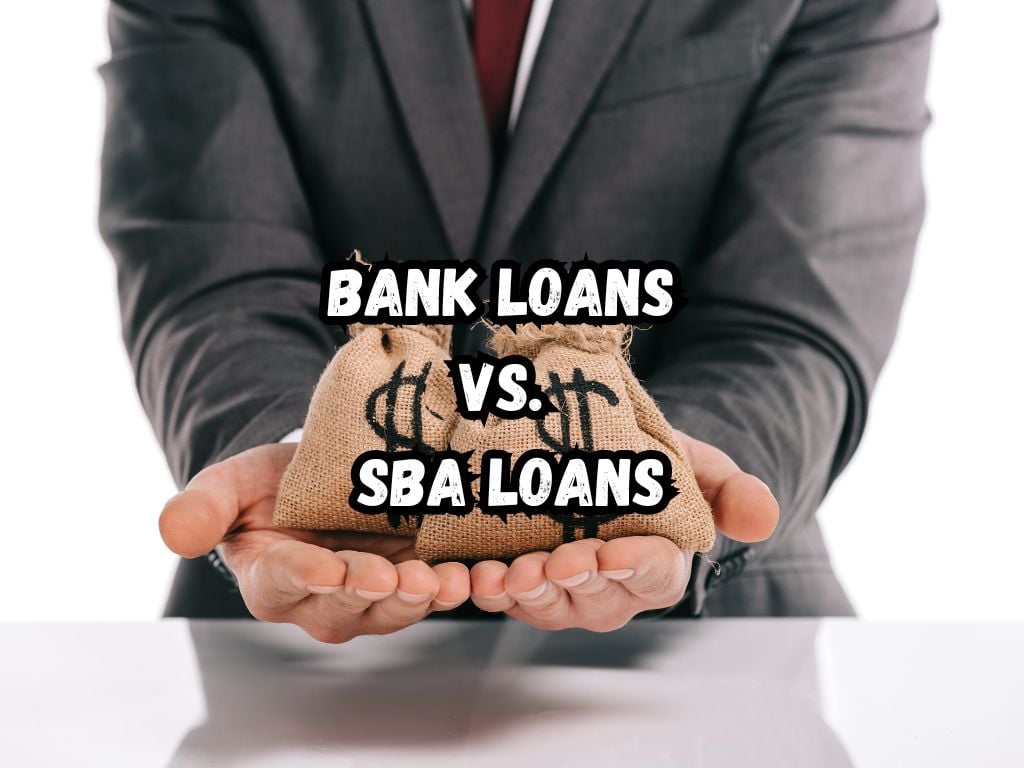Starting or growing a business often requires capital, and one of the most common ways to secure that capital is through loans.
Bank loans and Small Business Administration (SBA) loans are the go-to options for many entrepreneurs.
But choosing between bank loans vs SBA loans can be confusing. This article will provide a clear comparison of these two types of loans to help business owners make informed decisions.
Understanding Bank Loans
Definition and Overview
Bank loans are direct financial loans provided by banks to individuals or businesses for various purposes. They have been a traditional source of funding for many years. Today, banks continue to offer a range of products tailored to the needs of businesses of all sizes.
Key Features of Bank Loans
A typical bank loan is characterized by its interest rate, which may be fixed or variable, and its repayment terms, which dictate the schedule and amounts paid back to the bank.
Loan amounts can greatly vary, depending on the bank and the borrower’s creditworthiness.
To qualify, applicants usually need to meet specific requirements set by the bank, which may include a good credit score, a solid business plan, and collateral.

Advantages of Bank Loans
For those who qualify, bank loans can provide quick funding, often with competitive interest rates. They are flexible and can be used for a range of business needs, from operational expenses to capital investment.
Disadvantages of Bank Loans
Bank loans are not without drawbacks. They can have strict credit and collateral requirements.
Some businesses, particularly new ones with no credit history, might find it challenging to meet these criteria. As a result, these businesses could face rejection or higher down payments.
Understanding SBA Loans
Definition and Overview
Unlike bank loans, which come directly from financial institutions, SBA loans are backed by the Small Business Administration, a government agency.
The SBA guarantees a portion of these loans, reducing the risk for lenders and making it easier for small businesses to obtain financing.
Key Features of SBA Loans
SBA loans have distinct features, including competitive interest rates and favorable repayment terms.
They offer a variety of loan programs, such as the popular 7(a), 504, and microloan programs, each catering to different needs and offering different amounts.
Advantages of SBA Loans
A major benefit of SBA loans is their accessibility. They often require lower down payments and have less stringent collateral requirements than traditional bank loans.
This makes them an attractive option for small businesses and those who might not qualify for a bank loan.
Disadvantages of SBA Loans
SBA loans can have a lengthy application process. The government backing entails strict rules on how the funds can be used. This is to ensure that taxpayers’ money is being used to support viable small businesses.
Bank Loans vs SBA Loans: Comparing
Criteria for Comparison
When comparing bank loans to SBA loans, several criteria are important to consider. These include the differences in interest rates, eligibility requirements, the application process, and repayment terms.
Loan amounts and the specific purpose of the loan also play a critical role in determining the right choice.
Which Should You Choose?
The decision between a bank loan and an SBA loan depends on your business situation. Bank loans might be more suitable for those with strong credit and established businesses.
SBA loans might be preferable for new businesses or those that have struggled to secure traditional financing.

Pro Tips
To stand the best chance of success, it is crucial to prepare a strong loan application. This includes crafting a detailed business plan that clearly outlines how you will use the funds.
It’s also important to improve your credit score before applying, as this can greatly affect the terms of your loan. Consider carefully which type of loan aligns with your business needs and long-term goals.
Frequently Asked Questions
Can start-ups qualify for SBA loans?
Yes, start-ups can qualify for SBA loans, particularly through programs designed for new businesses.
How do I know if my business is eligible for a bank loan?
Eligibility for a bank loan typically hinges on your credit score, your business’s financial health, and collateral. Contact banks directly to understand their specific requirements.
What are the typical interest rates for bank loans vs. SBA loans?
Interest rates for bank loans can be either fixed or variable and are determined by the bank’s policies and your creditworthiness. SBA loans tend to have rates that are competitive, often falling below traditional bank loan rates.
How long does it take to get an SBA loan compared to a bank loan?
The SBA loan process can be longer due to the thorough review required for government-backed financing. Bank loans can sometimes be obtained faster, but this varies by institution and individual circumstances.
Can I have both an SBA loan and a bank loan at the same time?
Yes, it is possible to have both an SBA loan and a bank loan if you qualify for both and meet the terms set by each lender.
Conclusion
Bank loans and SBA loans have their own distinctive advantages and disadvantages. The choice will ultimately depend on your specific business needs, qualifications, and goals.
Careful evaluation and preparation can increase your chances of securing the right type of loan, setting your business on the path to growth and success.
Remember, it’s always wise to seek advice from a financial advisor to help navigate the complex world of business financing.


 Tags:
Tags:










